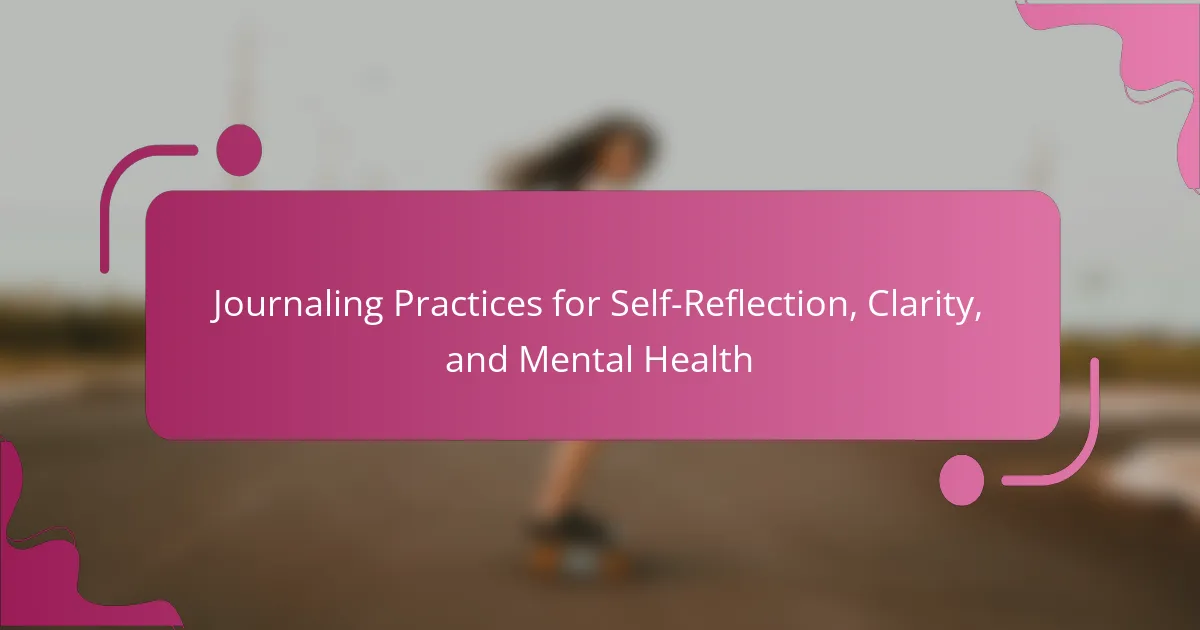Journaling practices can significantly enhance self-reflection, clarity, and mental health. This article explores various journaling methods, including expressive writing, gratitude journaling, and guided journaling. It addresses common challenges like consistency and self-doubt while offering structured techniques to optimize your journaling experience. By incorporating these practices, individuals can improve emotional regulation and foster personal growth.
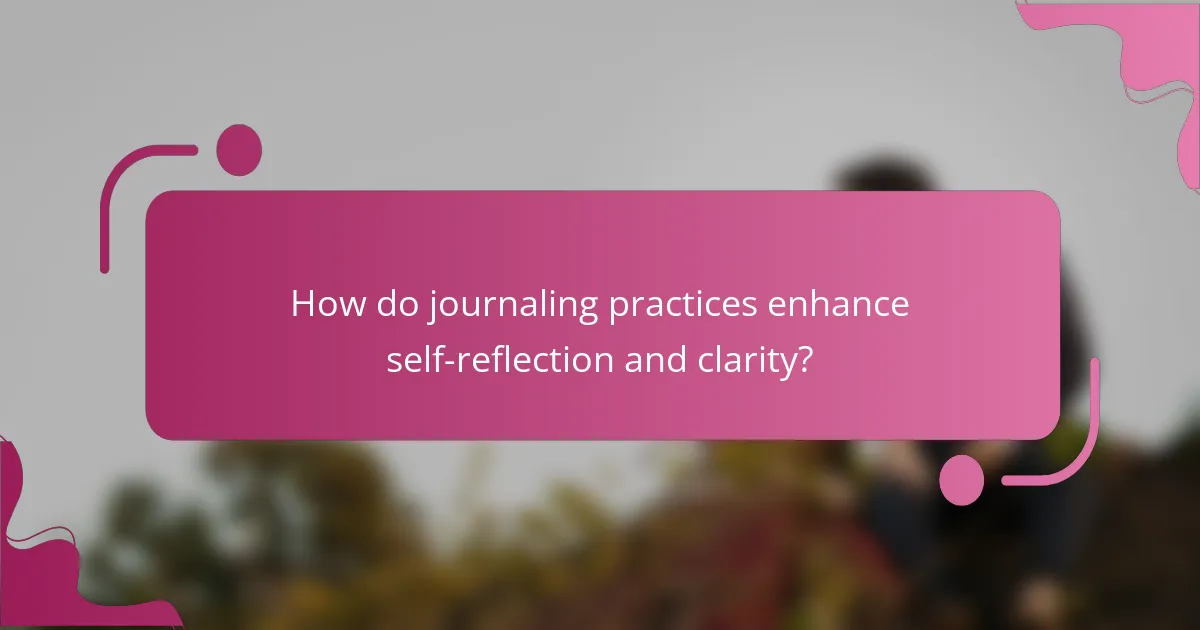
How do journaling practices enhance self-reflection and clarity?
Journaling practices significantly enhance self-reflection and clarity by providing a structured outlet for thoughts and emotions. Regular writing fosters deeper insights, allowing individuals to process experiences and identify patterns in their behaviour. This practice can lead to improved mental health by reducing stress and enhancing emotional regulation. Engaging in journaling cultivates mindfulness, promoting a clearer understanding of personal goals and values.
What are the psychological benefits of journaling?
Journaling offers significant psychological benefits, enhancing self-reflection, clarity, and mental health. It promotes emotional processing, reduces stress, and improves mood. Regular journaling can lead to greater self-awareness and personal growth, fostering a positive mindset. Research indicates that expressive writing can strengthen psychological resilience, helping individuals cope with challenges more effectively.
Which journaling techniques promote deeper self-awareness?
Journaling techniques that promote deeper self-awareness include reflective journaling, gratitude journaling, and stream-of-consciousness writing. Reflective journaling encourages individuals to explore thoughts and feelings, enhancing clarity. Gratitude journaling fosters positivity, shifting focus to what is valued. Stream-of-consciousness writing allows free expression, revealing subconscious thoughts. Each method supports mental health by facilitating emotional processing and insight.
How can journaling improve emotional intelligence?
Journaling enhances emotional intelligence by fostering self-awareness and reflection. It allows individuals to process emotions, recognise patterns, and develop empathy. Regular writing promotes clarity in thoughts, enabling better emotional regulation. Studies show that expressive writing can reduce stress and improve overall mental health.
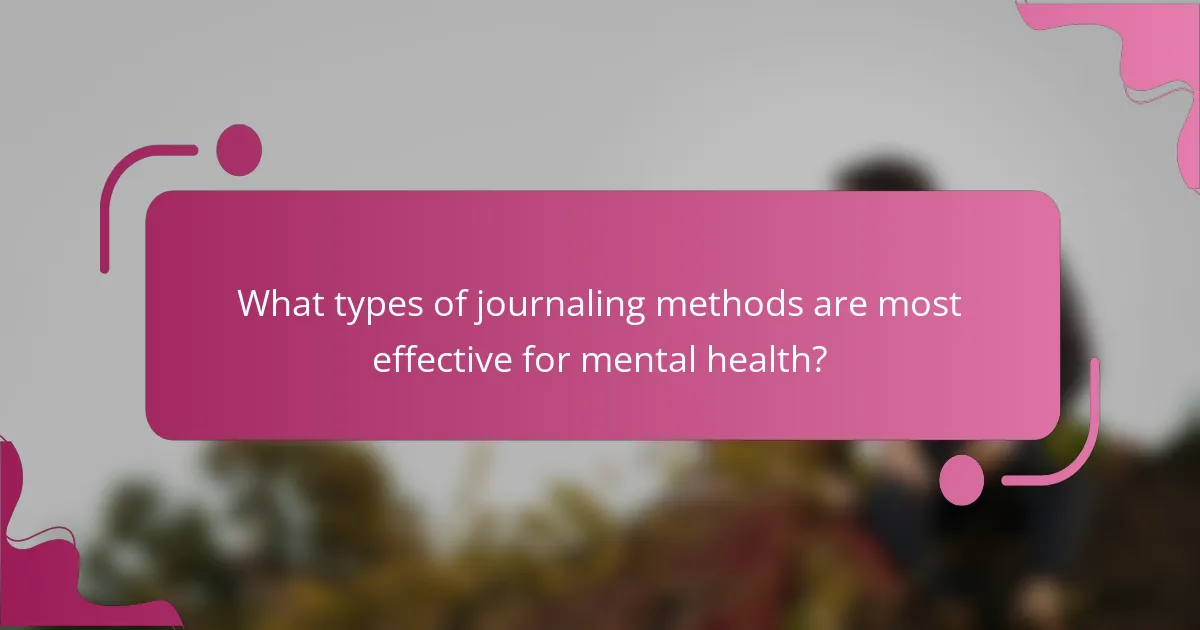
What types of journaling methods are most effective for mental health?
Journaling methods that enhance mental health include expressive writing, gratitude journaling, and guided journaling. Each method provides unique benefits for self-reflection and clarity.
Expressive writing allows individuals to explore emotions, reducing stress and improving mood. Research indicates that this method can lead to greater emotional resilience. Gratitude journaling focuses on positive experiences, fostering a mindset shift that enhances overall well-being. Guided journaling offers structured prompts, helping users navigate complex thoughts and feelings, which can lead to deeper insights.
Incorporating these journaling practices can significantly contribute to mental health improvement by promoting self-awareness and emotional processing.
Which journaling formats are popular in different cultures?
Journaling formats vary across cultures, each reflecting unique practices and values. Popular formats include reflective journaling in Western cultures, gratitude journals in the U.S., and bullet journaling globally, promoting organisation and mindfulness. In Japan, many engage in art journaling, combining creativity with self-reflection. In India, personal diaries often include spiritual reflections, emphasising inner peace. Each format serves the core purpose of enhancing self-awareness and mental health.
How do guided journals differ from free writing?
Guided journals provide structured prompts to facilitate reflection, while free writing allows unrestricted expression. Guided journaling focuses on specific themes or questions, enhancing clarity and direction. Free writing encourages creativity and spontaneity, promoting emotional release. Both practices support mental health but cater to different needs and preferences.
What role do digital journaling apps play in modern practices?
Digital journaling apps enhance self-reflection, clarity, and mental health by providing structured platforms for personal expression. These apps facilitate daily writing, allowing users to track emotions and thoughts, which promotes mindfulness. Features like prompts and mood tracking encourage consistent engagement, making journaling accessible and effective. Additionally, the ability to analyse entries over time offers insights into personal growth and mental well-being. Overall, digital journaling apps serve as valuable tools for enhancing self-awareness and emotional health.
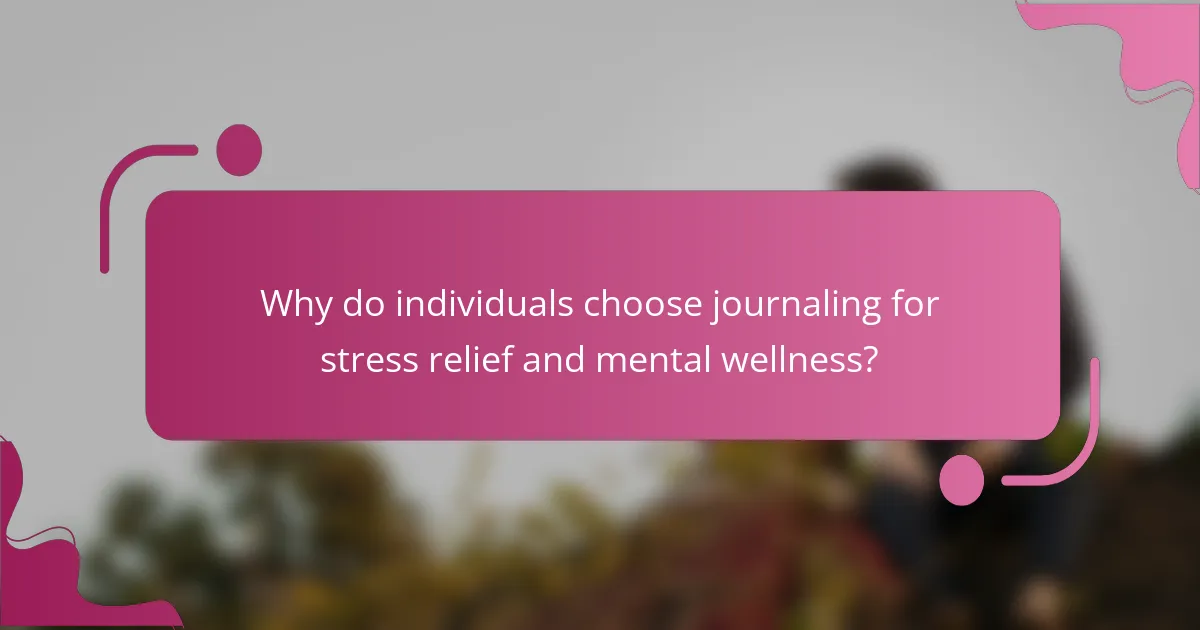
Why do individuals choose journaling for stress relief and mental wellness?
Individuals choose journaling for stress relief and mental wellness due to its ability to enhance self-reflection and provide clarity. Journaling helps process emotions and thoughts, leading to reduced anxiety and improved mood. Research indicates that expressive writing can lower stress levels and promote emotional well-being. Additionally, regular journaling fosters mindfulness, enabling individuals to stay present and focused. This practice can also serve as a unique tool for identifying patterns in thoughts and behaviours, ultimately supporting personal growth and mental health.
What specific mental health conditions can benefit from journaling?
Journaling can benefit various mental health conditions, including anxiety, depression, PTSD, and stress management. It provides a safe outlet for emotions and enhances self-awareness. For example, individuals with anxiety may use journaling to identify triggers and develop coping strategies. Those experiencing depression can track mood changes and reflect on positive experiences. PTSD sufferers often find relief in expressive writing, which aids in processing traumatic events. Additionally, journaling supports stress management by promoting mindfulness and clarity.
How does journaling compare to other therapeutic practices?
Journaling offers unique benefits compared to other therapeutic practices. It enhances self-reflection, clarity, and emotional processing. Unlike traditional therapy, journaling is accessible and can be done independently, promoting personal insight and mental health improvement.
Research indicates that journaling can reduce stress and anxiety, similar to mindfulness practices. However, it lacks the interactive support found in therapy sessions. Journaling is often more flexible, allowing individuals to express thoughts at their own pace.
In contrast, practices like cognitive-behavioural therapy (CBT) provide structured guidance, while journaling encourages spontaneous expression. Each method has its merits, but journaling uniquely empowers individuals to explore their feelings and thoughts without external influence.
Overall, journaling serves as a valuable complement to other therapeutic approaches, fostering personal growth and mental well-being.
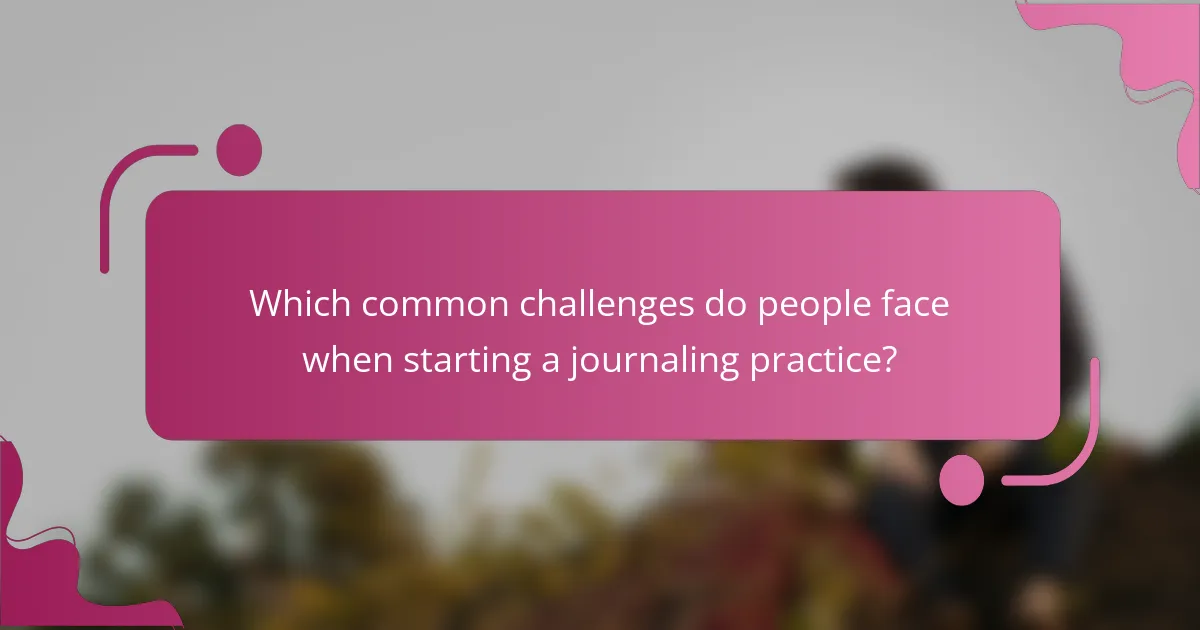
Which common challenges do people face when starting a journaling practice?
Many people face challenges like lack of consistency, self-doubt, and uncertainty about what to write when starting a journaling practice. These obstacles can hinder self-reflection and clarity.
Lack of consistency often stems from busy schedules or unclear goals. Individuals may struggle to establish a routine, leading to sporadic journaling efforts. Self-doubt can arise from comparing one’s writing to others or feeling that their thoughts are not worth recording. Uncertainty about what to write can create a mental block, making it difficult to begin.
Addressing these challenges involves setting specific goals, creating a dedicated time for journaling, and embracing free writing to overcome initial barriers.
What are the barriers to consistent journaling?
Barriers to consistent journaling include time constraints, emotional resistance, and lack of structure. Many individuals struggle to prioritise journaling amid busy schedules, leading to irregular practice. Emotional barriers, such as fear of confronting difficult feelings, can also hinder consistency. Additionally, without a clear structure or prompts, people may find it challenging to maintain engagement and develop a routine.
How can individuals overcome writer’s block in journaling?
To overcome writer’s block in journaling, individuals can use specific strategies. First, set a timer for short bursts of writing to reduce pressure. Second, use prompts or questions to ignite thoughts. Third, create a comfortable environment to foster creativity. Lastly, practice free writing without self-editing to enhance flow.
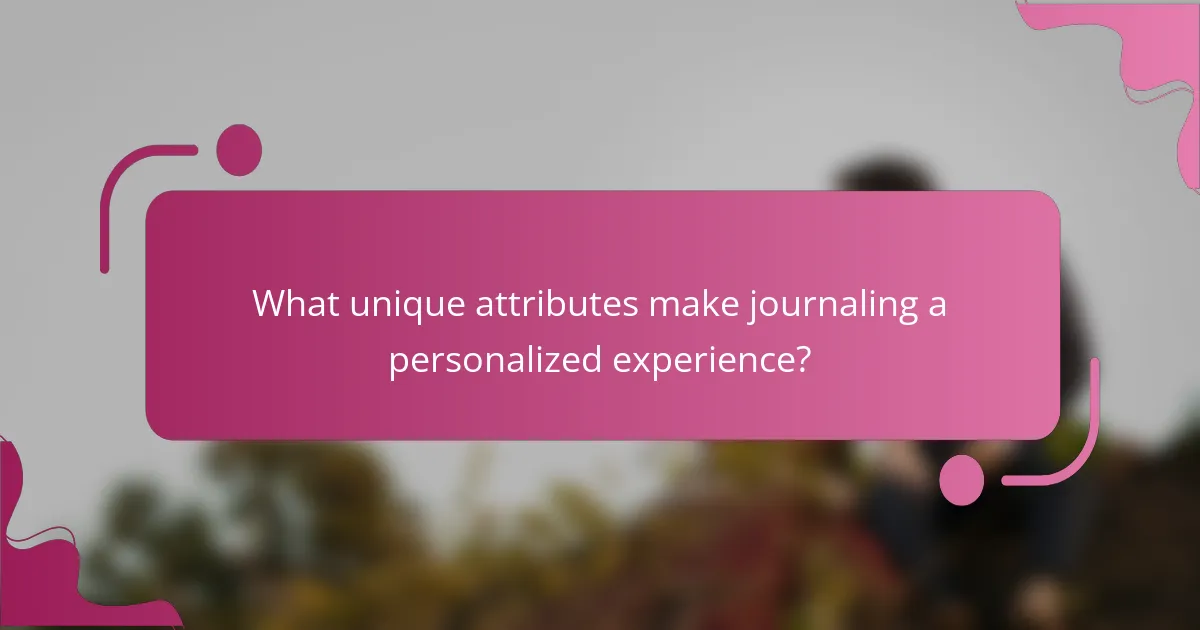
What unique attributes make journaling a personalized experience?
Journaling is a unique experience due to its customizable nature, allowing individuals to express thoughts in personal ways. Unique attributes include varying styles such as bullet journaling, gratitude journaling, and creative journaling, each catering to different emotional needs. The choice of format, whether digital or handwritten, also adds a personalized touch. Additionally, the use of prompts can guide reflection, making the process tailored to individual experiences and goals. This flexibility enhances self-reflection and mental clarity, making journaling a deeply personal practice.
How do personal styles influence journaling effectiveness?
Personal styles significantly enhance journaling effectiveness by aligning practices with individual preferences. Tailored approaches, such as expressive writing or structured formats, can boost engagement and clarity. For instance, visual journaling may benefit those who think visually, while narrative styles suit reflective thinkers. Adapting styles fosters deeper self-reflection and mental health benefits, making journaling a more impactful tool for personal growth.
What rare journaling practices have emerged in recent years?
Recent years have seen the emergence of rare journaling practices that enhance self-reflection and mental health. One notable practice is “visual journaling,” where individuals express thoughts through drawings and images rather than words. Another is “gratitude mapping,” which visually represents what one is thankful for, fostering positive mental states. “Stream of consciousness journaling” has gained traction, encouraging unfiltered thoughts to flow onto the page, promoting clarity and emotional release. Lastly, “digital detox journaling” focuses on reflections made during periods without technology, allowing deeper self-awareness and mindfulness.
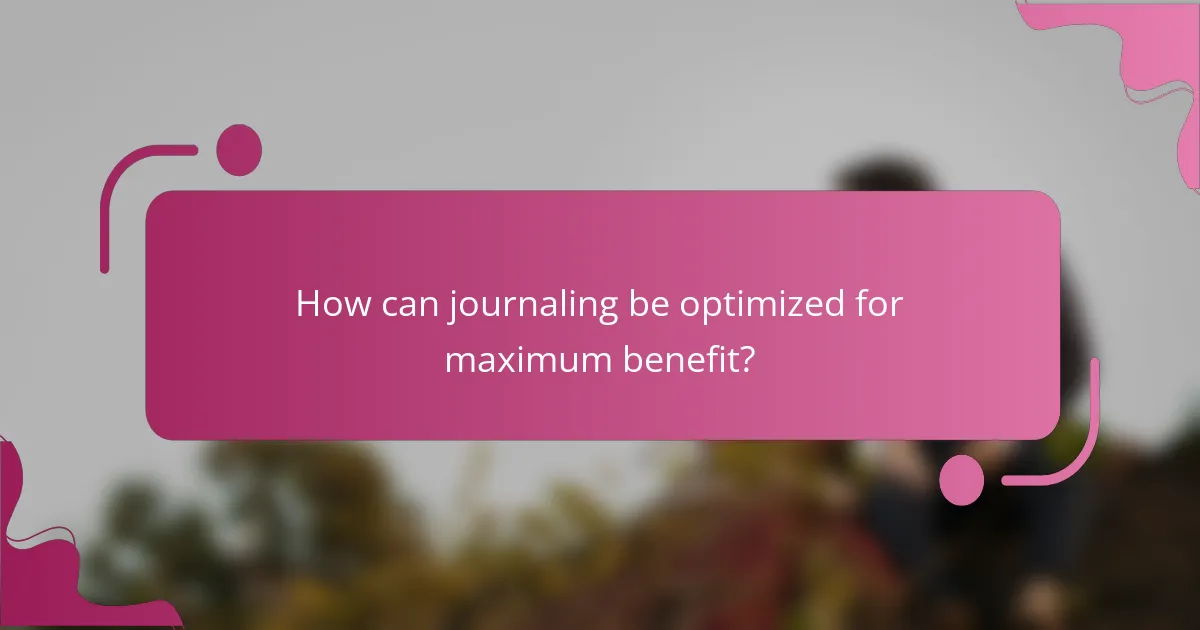
How can journaling be optimized for maximum benefit?
Journaling can be optimized by incorporating structured techniques that enhance self-reflection and mental clarity. Regularly set aside time for journaling, ideally daily, to establish a consistent practice.
1. Use prompts to guide your writing, focusing on specific themes such as gratitude, goals, or emotional experiences.
2. Implement bullet points or lists to organise thoughts clearly, making it easier to revisit entries.
3. Practice free writing for a set duration, allowing thoughts to flow without self-censorship, which encourages deeper self-exploration.
4. Reflect on past entries periodically to identify patterns and growth, aiding in long-term mental health benefits.
These practices can significantly improve the effectiveness of journaling, fostering a greater understanding of oneself and enhancing overall well-being.
What best practices should be followed for effective journaling?
Effective journaling requires consistency, reflection, and intentionality. Start by setting a regular schedule to make journaling a habit. Use prompts to guide your thoughts, focusing on feelings, experiences, or goals. Embrace honesty in your writing to foster deeper self-reflection. Experiment with different formats, such as bullet points or free writing, to find what resonates. Finally, review your entries periodically to gain clarity and track your mental health journey.
Which mistakes should be avoided in journaling practices?
To enhance journaling practices, avoid common mistakes that hinder self-reflection and clarity. First, neglecting consistency can lead to fragmented thoughts. Second, focusing solely on negativity may create a biased perspective. Third, skipping the review of past entries prevents growth and insight. Fourth, overthinking prompts can stifle creativity. Lastly, comparing your journaling journey to others can undermine personal progress.
